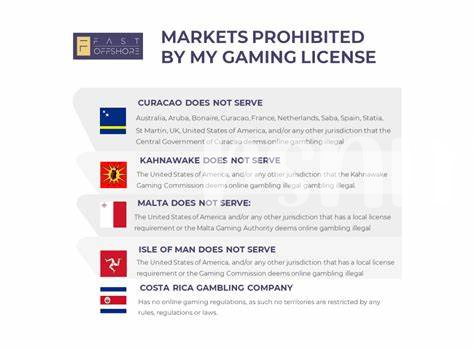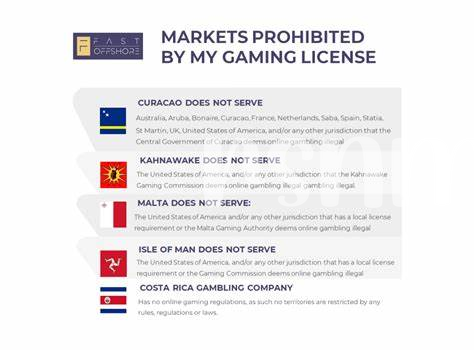Explore How Evolving Regulations Impact Casino Licenses Worldwide, Addressing Key Trends and Forecasts for Future Licensing Challenges and Opportunities in the Gambling Sector.
The Future of Casino Licensing: Trends and Predictions.
- 🌎 the Global Shift Towards Digital Casino Platforms
- 🚀 Rising Popularity of Crypto Casinos and Blockchain
- 🛡️ Stricter Regulations for Safer Online Gambling Experiences
- 🌿 Sustainable and Socially Responsible Gaming Initiatives
- 🎲 the Evolution of Live Dealer Games Technology
- 🤖 Ai and Machine Learning in Casino Operations
🌎 the Global Shift Towards Digital Casino Platforms

As the digital wave rides high, the transformation of traditional casino floors into vibrant digital arenas is inevitable. The blurring lines between the physical and virtual worlds have catapulted online platforms to the forefront, enticing a global audience with the allure of instant access and a boundless variety of gaming experiences. This shift isn’t just about the technology; it’s about changing the very ethos of gambling, making it a ‘pharm party’ where the cocktail of games is ever-expanding. With players logging in from every corner of the globe, the digital casino has become a melting pot of cultures, all united by their love of the game. The ease of access – be it from a desktop at home or a mobile phone while commuting – has seen the popularity of these platforms skyrocket, creating a demand that is rapidly reshaping the industry’s landscape.
| Year | Global Online Gambling Market Size |
|——|————————————|
| 2020 | $64.13 Billion |
| 2021 | $72.02 Billion |
| 2022 | $81.08 Billion |
| 2023 | (Projection) $92.9 Billion |
Yet, this transition to digital is not without its potholes. The elixir of convenience may come with a side effect of increased security concerns, urging operators to employ robust measures to protect players. Goverment and regulatory bodies are also playing catch-up, adapting and evolving to oversee this virtual gold rush effectively. Enhanced verification processes, bulletproof encryption, and fair play algorithms have become non-negotiable elements of a licensed online casino’s blueprint. As we advance, the synergy between technology and trust will defiinately dictate the pace at which this digital evolution occurs, promising a future where the thrill of the casino can be a safe and just a click away experiance for everyone involved.
🚀 Rising Popularity of Crypto Casinos and Blockchain

In an era where digital innovation is king, the integration of cryptocurrency and blockchain technology into the casino sector represents a monumental shift. This transformation is not just reshaping the gaming floor but also providing a solution to some of the perennial license issues with casinos in different countries. As crypto casinos gain traction, they bring with them the promise of enhanced transparency and security, elements that are highly prized in any realm of gaming. The decentralised nature of blockchain effectively sidesteps some traditional hurdles related to currency exchange and regulation, offering a smoother, borderless experience for players worldwide.
However, this burgeoning popularity comes with its own set of challenges. Goverment and regulatory bodies are playing catch-up, striving to implement frameworks that can acommodate the novel nature of blockchain transactions while ensuring player safety. This regulatory limbo raises significant questions about the future: How will jurisdictions reconcile the inherently anonymous and transnational nature of crypto transactions with the localized, stringent requirements of casino licensing? It’s a complex puzzle that regulators will need to solve, combining innovative technological approaches with robust legal frameworks to protect consumers and ensure fair play.
Another dimension to this shift is the technological underpinning that makes it all possible. The utilization of blockchain is not just a boon for financial transactions but also serves as a bedrock for enhancing game integrity. Through smart contracts and verifiable transactions, players and operators alike can benefit from an unalterable record of bets and outcomes, effectively nullifying concerns over rigging or fraud. This fusion of technology and trust could revolutionize the concept of fair play in the industry, marking a significant step forward in the quest for a secure, equitable gaming experience. Despite the potential hurdles, the forward momentum of crypto casinos and blockchain integration into the gaming sector signals a new era of innovation and transparency in gambling.
🛡️ Stricter Regulations for Safer Online Gambling Experiences

In the ever-evolving landscape of online gambling, regulators worldwide are increasingly turning their focus towards bolstering the safeness of digital gaming environs. This paradigm shift is rooted in recognising the paramount importance of protecting players from the potential pitfalls of internet betting. With the surge in digital platforms, license issues with casinos in different countries have come under the spotlight, prompting a global reevaluation of existing frameworks. Governments are now more inclined to revamp their regulatory measures, ensuring that they can effectively oversee the burgeoning sector and shield their citizens from harm.
🌍 One pressing challenge that regulators are confronting is the intricate web of laws that vary significantly across borders. This diversity complicates efforts to achieve a harmonised approach to online gambling regulation. Consequently, there is a palpable movement towards adopting more stringent criteria for obtaining and retaining a lisence in the casino industry. Operators are now expected to adhere to higher standards of player protection, data security, and fair play to maintain their operational status.
🚀 Beyond mere compliance, there is a burgeoning trend towards fostering responsible gaming practices. The emphasis is not just on penalising malpractices but on encouraging casinos to proactively implement measures that promote healthier gambling behaviors. Initiatives such as self-exclusion schemes and mandatory reality checks are gaining traction, illustrating the industry’s shift towards a more accountable and player-centric approach.
In essence, the future portends a more secure and responsible digital gambling environment, underpinned by rigorous regulations that ensure casinos operate ethically and transparently. As the industry continues to mature, the focus will invariably remain on advancing technologies and innovations that facilitate safer and more enjoyable online gambling experiences for users worldwide. This evolution reaffirms the critical role of stringent regulatory oversight in safeguarding the integrity of the casino sector, elevating both player trust and industry standards.
🌿 Sustainable and Socially Responsible Gaming Initiatives
As the global casino industry pivots towards integrating more sustainable and socially responsible practices, the ripple effect on lisence issues with casinos in different countries is becoming increasingly pronounced. The industry’s move to embrace eco-friendly operations doesn’t just stop at reducing energy consumption or minimizing waste; it extends to leveraging technology to promote fair play and protect vulnerable players. This transformative journey signals a shift in how the governance and regulatory framework for casinos are evolving, mirrored in the altering landscape of lisence requirements across jurisdictions. By integrating strict measures that mandate operators to adopt greener practices and champion social responsibility, governments are recalibrating the standards for obtaining and retaining a casino lisence. This paradigm shift is not without its challenges, as operators navigate through the complexities of aligning their business models with these emergent regulatory demands while striving to remain competitive and innovative.
In tandem with these changes, the conversation around responsible gaming is gaining momentum, putting pressure on casinos to act stat. Operators are now looking beyond the conventional business model, scouting for innovations that can bridge the gap between profit and responsibility. This includes deploying AI and machine learning not just to enhance user experience but to pioneer preemptive support for problem gamblers. The application of technology for good, so to speak, is setting a new precedent in how casinos operate, encoraging a culture where the well-being of the player is as paramount as the thrill of the game. These initiatives, while fostering a safer gambling environment, also challenge the status quo, prompting a rethink of what it means to gamble responsibly in the digital age. As these trends continue to unfold, the casino industry stands at the cusp of a revolution, one that promises to redefine gaming ethics in a digital- first world, balancing the scales between entertainment and wellbeing.
🎲 the Evolution of Live Dealer Games Technology

Live dealer games have transcended the traditional framework of online casinos, bringing a blend of digital convenience and authentic gaming experience right into players’ living rooms. This evolution draws from advancements in streaming technology and user interaction methodologies, creating a platform where the thrills of Vegas can be experienced without the need for expensive travel. License issues with casinos in different countries play a crucial role in shaping this landscape, as operators must navigate varying regulations to offer their services globally. This complexity has spurred innovations in licensing, ensuring that players have secure and fair access to live dealer offerings, irrespective of their geographic location.
The integration of high-definition live streaming, coupled with interactive features like live chat, has seen a substantial uptick in popularity. It fosters a social environment, mimicking the atmospheric presence found in land-based casinos. This immersive experience is further enhanced by the sophistication of RFID technology, allowing for real-time data transmission and game outcomes, adding layers of transparency and trust between the player and the dealer. As these technologies continue to refine, the future beckons even more seamless interaction, pushing the boundaries of what can be achieved in digital gaming environments.
| Trend | Impact |
|---|---|
| High-Definition Streaming | Enhances player engagement through superior quality visuals and seamless gameplay. |
| Interactive Features | Boosts the social aspect of online gambling, mimicking the environment of a physical casino. |
| Advanced Security Protocols | Ensures safer gambling experiences by protecting player data and maintaining game integrity. |
In parallel, the regulatory framework around live dealer games is tightening, a move designed to protect gamblers from potential harm. While this makes the licensure more challenging to aquire for operators, it benefits the industry as a whole by bolstering consumer confidence in these platforms. As we navigate these developments, the confluence of regulation, technology, and player demand is setting the stage for an unparalleled era in the realm of live dealer casino games, promising a future where entertainment and safety go hand in hand.
🤖 Ai and Machine Learning in Casino Operations
In the rapidly evolving landscape of the casino industry, the advent of AI and machine learning has signalled a transformative shift in how operations are managed and optimized. These cutting-edge technologies offer a potential elixir to the age-old challenges of operational efficiency, customer satisfaction, and security concerns. By harnessing data at an unprecedented scale, casinos can now predict customer preferences with astonishing accuracy, personalize gaming experiences, and streamline backend processes. This not only enhances the player’s journey but also bolsters the casino’s bottom line.
The integration of AI into casino security measures is akin to having an ever-vigilant robot, minus the sci-fi dramatization, tirelessly monitoring for fraudulent activities and potential threats. This technological sentinel can analyse patterns and flag irregularities faster and more reliably than humanly possible, ensuring a safe and fair environment for patrons. Moreover, machine learning algorithms can optimize game recommendations, making every visit a bespoke experiacne tailored to individual tastes and historical behaviour.
Yet, the road ahead is not without its bumps. Questions around ethics, privacy, and the sheer pace of technological change pose significant challenges. Casinos navigating this digital revolution must do so with a keen eye on responsible gaming and regulatory compliance. The potential for AI and machine learning to refine operations and create more dynamic gaming environemnts is undeniably vast. However, balancing innovation with ethical considerations will be key to sustaining trust and integrity in the casino industry’s future.


